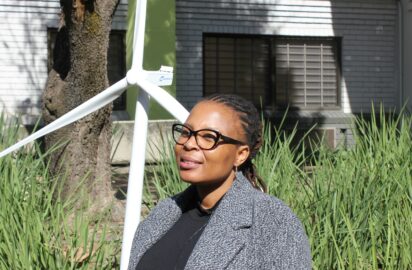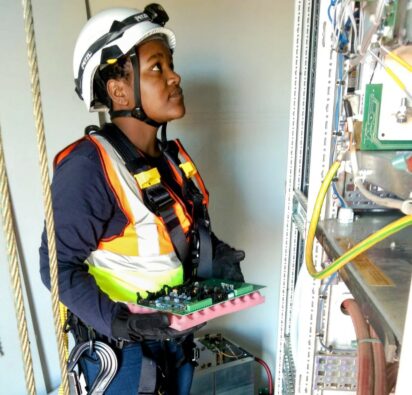
Mamoso May is the CEO of Dorper Wind Farm, an Independent Power Producer in the Eastern Cape of South Africa with a generation capacity of 100 MW. Her successful career path was not linear: When Mamoso was at university , she worked part time as a server in a restaurant. One of the guests offered her a job in her accounting business. From there Mamoso worked her way up and gained more experience until she joined Dorper Wind Farm in 2013.
South Africa’s renewable energy procurement policy is unique globally in its emphasis on providing benefits for communities in the vicinity of projects. Dorper Wind Farm has invested in the neighbouring communities of Molteno and Sterkstroom in several ways. For example, they fixed windows and doors of the local school so that pupils do not freeze in cold winters. They also installed toilets in the school, run health tests, and support promising students to enable them to go to university. It is this part of her work that Mamoso values the most.
“Women still need to choose between career and family”
Mamoso’s career came with a price. She waited to have children because she did not want to be excluded. A former manager told her that he did not want to employ young women because they might get pregnant and miss work. She has seen women work during their maternity leave out of fear of being disadvantaged. With no obligation for South African employers to pay women during maternity leave, they have to rely on unemployment benefits, so they also face financial insecurity.

In her experience, another barrier for women is the way in which their male peers are organized: “Men have clubs. They do not call them that, but they are clubs.” In response, women are now coming together in their own closed circles. But in Mamoso’s view, these solely male, solely female clubs are not the way forward: “We need respected men to speak on behalf of women – a male sponsor that brings women to the table.” In her opinion, this approach is more beneficial than the guidance of a female mentor. But to see real change, she emphasizes that it also takes people in charge willing to employ women in STEM jobs (science, technology, engineering, or math), and men in non-STEM jobs. With traditional STEM careers, there is still the stereotype that jobs are “too rough for women”. The energy transition is creating new jobs that require diverse skills, and Mamoso sees lots of opportunities for women in the renewable sector, even those who do not want to work “with their hands”.
Based on her own experience, she gives one recommendation: “Surround yourself with people that trust you, and find a board that believes in you.” A piece of advice surely easier said than done, but Mamoso’s career and her cheerful charisma prove that it is possible.
This article is the summary of an interview, conducted in the course of our research on opportunities and barriers for women in the power sector in South Africa.
